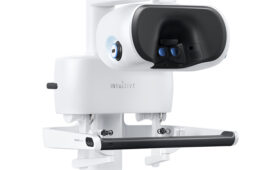
Adaptiiv’s 3D-printed boluses are printed from material that has a uniform thickness and conforms to patient anatomy. (Image courtesy of Adaptiiv.)
Adaptiiv Medical Technologies said that the U.S. military will use its 3D bolus software to treat American veterans with cancer at Walter Reed National Military Medical Center.
Adaptiiv designed its software to convert patient CT scan data into a digital model that can be used to print a bolus that conforms to patient anatomy, according to the company. The structure is then exported as an STL file that can be printed in a matter of hours on a healthcare facility’s existing 3D printer or on a printer provided by the company.
Using Adaptiiv software, practitioners can 3D print patient-specific, uniform thickness boluses, modulated boluses for modulated electron radiation therapy (MERT), high-dose-rate (HDR) surface brachytherapy and other potential ancillary devices. The boluses are printed using durable, tissue-equivalent materials that hold their shape and do not degrade during treatments. Patients typically use the same 3D printed bolus for the duration of their treatment, reducing the risk of infection. Patients are more comfortable throughout the treatment period, while set-up and production times are reduced, the company said.
“We could not be more honored to make this announcement,” said Peter Hickey, CEO of Halifax, Nova Scotia-based Adaptiiv, in a statement. “Working with the team at Walter Reed, Adaptiiv continues to make significant strides in the battle against cancer while transforming novel and experimental ideas into real-world applications.”
Formerly known as 3D Bolus, Adaptiiv is the first company in the world to receive FDA 510k clearance for 3D printing software used in radiation oncology. The company’s software is used in the United States, Canada, Australia, Israel, Ireland, Hong Kong and England.

![A photo of the Medtronic GI Genius ColonPro polyp detection system flagging a potential sign of colon cancer during a colonoscopy. [Photo courtesy of Medtronic]](https://www.medicaldesignandoutsourcing.com/wp-content/uploads/2024/04/Medtronic-GI-Genius-doctors-268x170.jpg)


